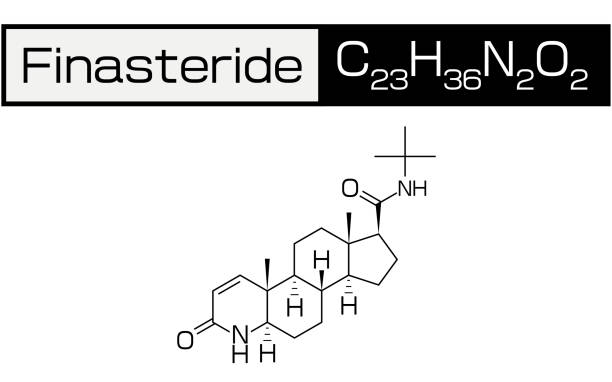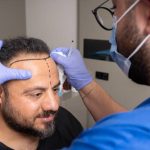November 3, 2023 By simonw Comments are Off
Table of Contents
Finasteride side effects: A Comprehensive Guide
What is Finasteride?
Finasteride is an FDA-approved oral tablet primarily prescribed for two conditions: androgenetic alopecia, more commonly known as male pattern hair loss, and symptoms of benign prostatic hyperplasia (BPH), an enlarged prostate. Marketed under Propecia for hair loss and other brand names for prostate conditions, Finasteride belongs to the category of medicines known as α-reductase inhibitors. This medication works by preventing the transformation of testosterone into dihydrotestosterone (DHT) within the hair follicles, lowering DHT levels. While DHT is vital for abnormal sex organ development during fetal growth, in adults, higher doses can lead to hair loss and prostate complications. For a thorough insight, this guide focuses on exploring Finasteride side effects, equipping current and prospective users with the necessary information to make an informed choice regarding its consumption.
How does Finasteride Work?
Finasteride’s primary mechanism lies in its ability to target and inhibit the 5α-reductase enzyme responsible for converting testosterone to DHT. Reducing DHT levels in the scalp and prostate promotes hair growth and shrinks an enlarged prostate, respectively.
Clinical research indicates enhanced hair growth and reduced hair thinning with regular use of Finasteride.
Common Finasteride side effects
Like all prescription drugs, the use of Finasteride comes with potential side effects. It’s crucial to be knowledgeable and speak with a healthcare professional to evaluate the potential advantages of the possible side effects.
Sexual Side Effects
The most frequently reported side effects of Finasteride are related to sexual function. These may include:
- Erectile dysfunction
- Ejaculation disorder
- Decreased libido
Long-term use of Finasteride has also been linked to persistent erectile dysfunction in some rare cases. Some reports suggest that even after withdrawal of treatment, these sexual dysfunctions can persist, leading to what is termed a post-finasteride syndrome.
Psychological Side Effects
Some users have reported psychological side effects such as:
- Memory loss
- Depression
- Confusion
It’s essential to consult a health care professional if one experiences such side effects, as they may advise discontinuation or suggest alternative treatments.
Physical Side Effects
Apart from the sexual and psychological side effects, finasteride use has been associated with several physical adverse effects, including:
- Allergic reactions may manifest as itching, rash, swelling, and, in very serious cases, difficulty breathing.
- Pain in the testicles.
- Symptoms like nausea, stomach pain, and jaundice showcase liver problems.
- An increased risk of high-grade prostate cancer.
Moreover, women who are or may become pregnant should not handle crushed or broken finasteride tablets, as they can cause congenital disabilities in a male fetus.
Long-Term Finasteride side effects
Finasteride, an active ingredient that serves as a 5-alpha reductase inhibitor, has been widely recognized in clinical trials for its effectiveness in treating male pattern baldness. While it is a popular drug approved by the FDA (Drug Administration) in the United States and Health Canada, concerns arise when considering the long-term side effects of Finasteride.
Post-Finasteride Syndrome
Post-Finasteride Syndrome refers to a cluster of persistent adverse events occurring months or even years after discontinuing the drug. Some of the most common side effects of Finasteride include sexual dysfunction, where the individual may experience symptoms such as erectile dysfunction and decreased libido. Although a complete list of possible side effects is available on the Patient Information Leaflet and from healthcare professionals, recent finasteride studies have been directed towards understanding this syndrome’s full extent.
Cognitive Impact
The drug’s effect on testosterone levels and its role as a 5-alpha-reductase inhibitor might contribute to cognitive changes. Some patients have reported memory lapses, difficulty in concentration, and other cognitive disturbances after prolonged use of Finasteride. However, data in this area is still emerging, and more comprehensive studies are needed.
Potential Impact on Prostate Health
Finasteride is also prescribed for symptoms of BPH (Benign Prostatic Hyperplasia). While it can reduce prostate size and alleviate BPH symptoms, there’s some debate about its influence on prostate cancer risk. Specific antigen tests, laboratory tests, and regular follow-ups with a doctor are recommended for patients using Finasteride to monitor any potential adverse events related to prostate health.
Managing Finasteride side effects
Dealing with the side effects of any medication is crucial. With Finasteride, understanding the risk of side effects and proactively managing them is essential.
Medical Interventions
If severe side effects are observed, immediate medical attention is necessary. A healthcare professional can guide possible uses of other drugs or interventions that mitigate the unwanted effects of Finasteride. In some cases, doctors might adjust the dosage or recommend discontinuation. It’s crucial to read the prescription label, follow directions, and consult a pharmacist for drug interactions.
Lifestyle Changes
To combat some of the side effects, especially those related to mental health and sexual function, lifestyle interventions can be beneficial. Regular exercise, a balanced diet, stress-relief practices, and adequate sleep can help alleviate some symptoms. However, it’s always essential to discuss these symptoms with a healthcare professional for personalized advice.
Finasteride and Male Pattern Baldness
Finasteride’s rise to fame in the medical world has been due to its effectiveness in treating male pattern baldness.
Understanding the Link
Male pattern baldness, or androgenetic alopecia, results from the shrinking of hair follicles, which is linked to the hormone DHT (Dihydrotestosterone). Finasteride, as a 5-alpha-reductase inhibitor, prevents the conversion of testosterone to DHT. By doing so, it can promote hair growth and prevent further hair loss. However, not all men will experience these benefits, and for some, the adverse effects might outweigh the benefits.
Weighing the Benefits Against Side Effects
When considering Finasteride for the treatment of male pattern hair loss, it’s essential to weigh its potential benefits against its side effects. While the drug has proven efficacy in promoting hair growth in many men, the possibility of severe side effects, especially after long-term use, cannot be ignored. Discussions with a healthcare provider can help individuals make the right choice, considering their circumstances.
Studies and Research on Finasteride Side Effects
Recent Findings
Finasteride, an oral medication mainly used to treat male pattern hair loss and enlarged prostate, has been scrutinized by the scientific community for years. Recent animal studies have indicated certain adverse effects, but it’s essential to discern the relevance of these findings in humans. A significant meta-analysis incorporated data from several clinical trials, revealing that while the majority of healthy men taking the drug reported no serious side effects, a small percentage did experience issues such as liver disease, an effect of Finasteride on the optic nerve, and even a very serious allergic reaction.
As for Finasteride’s side effects on pregnant women, they are advised against handling the drug. It’s been observed that it can affect the unborn baby, especially if the product comes in contact with the skin. This concern arises from data suggesting the active ingredient might be absorbed through the skin, potentially impacting the fetus. Pregnant females are also warned against consuming breast milk from someone taking the medication, given the unknown distribution of the drug in human milk.
Controversies and Conflicting Studies
Finasteride research has not been without its controversies. For example, some studies have indicated a higher risk of breast cancer in men taking the medication, while others have not found this connection. Additionally, First DataBank, a licensed data provider, reported adverse events that differ from other studies. This raises questions about the complete information available regarding the drug’s side effects and has led to calls for more transparent research practices.
Another topic of debate has been the improvement of seminal quality in patients using the drug. Some placebo-treated men reported a decrease in seminal quality, while in the placebo group, the reports were inconclusive. This discrepancy has led to further investigations into the inactive ingredients in generic drugs and their potential influence on the outcomes.
Consultation and Communication: Talking to your Doctor about Finasteride
Essential Questions to Ask Your Doctor
When considering Finasteride, it’s vital to consult with a healthcare professional. Preparing a list of questions is advisable. Some examples include:
- What is the potential effect of Finasteride on my current medical conditions?
- Can it interact with my current medications or products I’m using?
- What are the following conditions or side effects I should be aware of while on the medication?
- Given my circumstances, is taking this drug regularly advisable?
Understanding your Risk Factors
People react differently to medications due to their unique medical conditions, genetics, and lifestyle. It’s crucial to understand if you’re at a higher risk of developing serious side effects. For instance, those with a history of liver disease might be more susceptible to complications. Similarly, certain medical conditions might make a person more prone to allergic reactions. It’s essential to divulge your complete medical history to the Doctor to assess the potential risks accurately.
Conclusion: Finasteride side effects: is it Right for You?
In conclusion, Finasteride, approved by the FDA for prescription use, targets conditions like male pattern hair loss (androgenetic alopecia) and the symptoms of benign prostatic hyperplasia (BPH). Commercially available as Propecia for hair regrowth and under other brand names for prostate conditions, this α-reductase inhibitor halts the transformation of testosterone into DHT in hair follicles, thus decreasing DHT levels. While DHT is significant in fetal development, its excess in adults can prompt hair loss and prostate complications. Awareness of Finasteride’s side effects is paramount for those considering this medication. This guide aimed to provide an in-depth understanding of these side effects, the drug’s efficacy, and its interactions. The drug should be stored at room temperature, and individuals with liver disease must approach it with caution. Immediate medical attention is required for symptoms like nipple discharge, breathing difficulties, or changes in sexual desire. Before commencing Finasteride, a consultation with a healthcare professional or pharmacist is vital, especially if prostate cancer is a concern. Any side effects should be promptly reported to a doctor. Beyond its applications for hair growth and BPH, evaluating the drug’s overall safety, its role in symptom improvement, and potential interactions is paramount.
Seeking Alternative Treatments
Should one conclude that Finasteride isn’t the right choice due to its potential side effects or individual preferences, there are other treatments to consider. Treatments such as PRP therapy, available at Hairlossclinic.ca in Toronto, GTA and Winnipeg, present viable alternatives. Numerous nonprofit organizations and esteemed medical facilities offer extensive resources and advice on these alternatives.
To wrap up, while Finasteride serves as a beacon of hope for many facing challenges like male pattern baldness or an enlarged prostate, it’s paramount to be well-versed in it. Ensuring you have a thorough understanding, recognizing associated risks, and fostering open dialogue with your healthcare specialist can guide you to an informed decision. Always keep the medication at room temperature, safeguard it from children, and only share or distribute medications with proper authorization.
Q&A
What are the common Finasteride side effects should patients be aware of?
Finasteride’s side effects can vary among individuals, but some of the most common include changes in sexual desire, decreased ejaculate volume, and rash.
It’s vital to discuss any side effects you experience with a healthcare specialist.
Are there any following side effects that occur after discontinuing the use of Finasteride?
Yes, some patients report experiencing side effects even after discontinuing the drug. This phenomenon is sometimes referred to as “Post-Finasteride Syndrome.”
Is there a known treatment for the side effects caused by Finasteride?
There are known treatments that can help manage some of the side effects of Finasteride.
It’s vital to consult a healthcare specialist to determine the optimal strategy.
How do the known treatments for Finasteride’s side effects work?
Known treatments often address the hormonal imbalances caused by the drug. This might involve hormonal therapy or other medications to mitigate the side effects.
Can Finasteride affect lung health?
While Finasteride is primarily known for its impact on prostate health and hair growth, there aren’t many studies linking it directly to lung issues. Nonetheless, any worries regarding lung health or other possible adverse reactions should be addressed with a healthcare professional.
What should I do if I experience a medical emergency while on Finasteride?
In a medical emergency, it’s vital to seek medical help immediately. Ensure you inform the healthcare provider about your finasteride usage and any other medications you might be on.
Are there nonprofit organizations that provide resources and support for individuals experiencing Finasteride’s side effects?
Yes, several nonprofit organizations offer information, resources, and support for those affected by the side effects of medications, including Finasteride. They can provide valuable insights and assistance for patients.
Is it safe to prescribe Finasteride to pediatric patients?
Finasteride is not typically prescribed to pediatric patients. The safety and efficacy of this drug in children have not been established. Always seek advice from a pediatrician before administering any medication to a child.
How does the withdrawal of treatment lead to changes in the side effects of Finasteride?
Withdrawal of treatment leads to a cessation of the drug’s influence on the body. Some side effects may lessen or disappear, while others, especially hormonal imbalances, might persist or even intensify for a period.
If I experience severe side effects, how quickly should I seek medical help?
If you experience severe or alarming side effects, it’s essential to seek medical help immediately. It’s always better to be cautious and ensure your safety.
Book Your Free Consultation Today Or Call (647) 492-9093
Comments are closed.
















